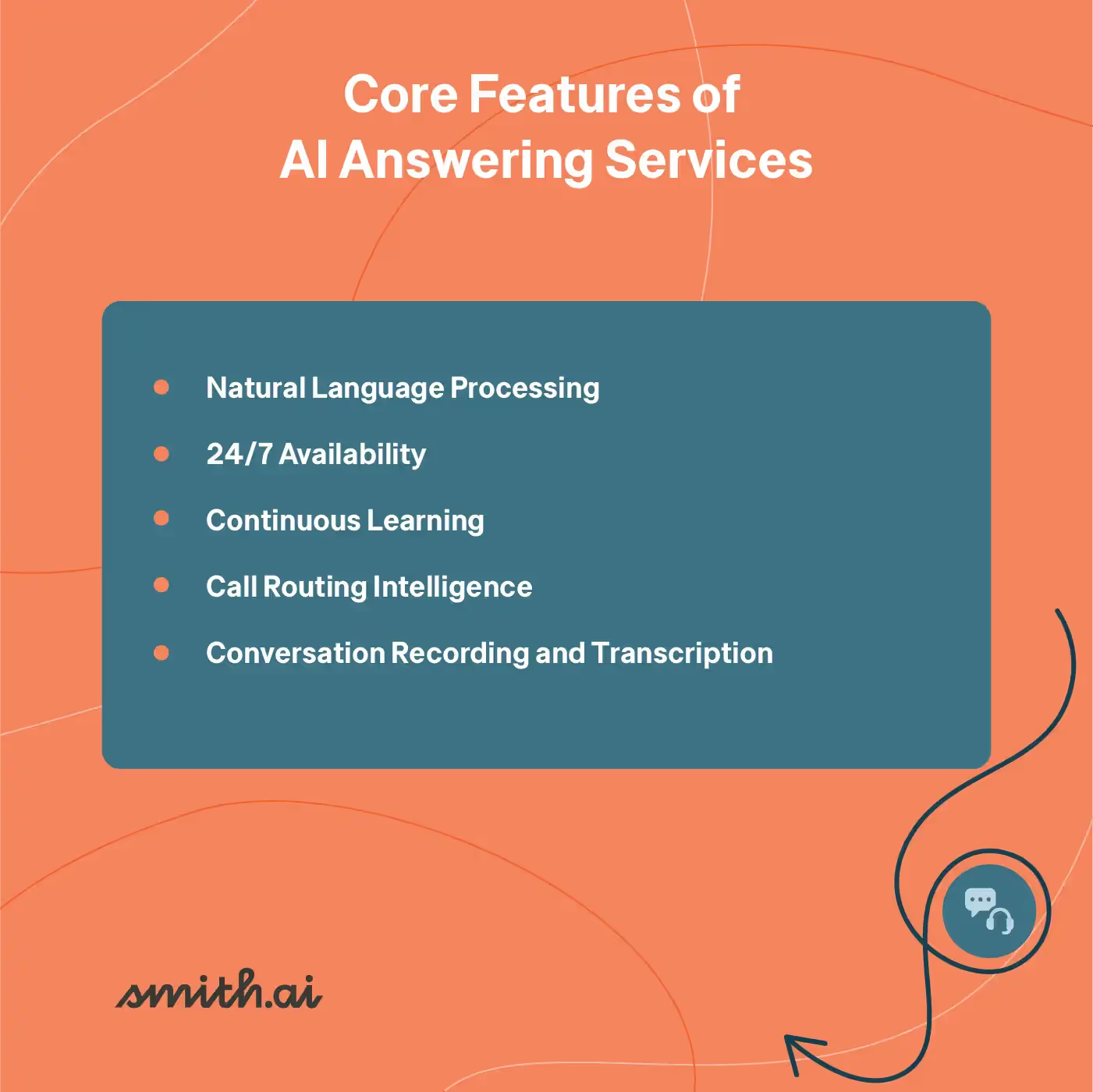The Best AI Answering Service for Business
The Best AI Answering Service for Business

Ever had that moment when you're juggling three tasks at once and the phone rings... again? You know exactly how it feels when customer calls pile up, and you're stuck choosing between answering the phone or finishing that crucial project.
You're not alone. The way you handle those incoming calls can literally make or break your customer relationships. And let's be honest. Those relationships are the lifeblood of your business.
The good news is that new technologies are here to help your business. Whether you're using AI or not, it's likely your competitors are. In fact, 75% of small and medium businesses are experimenting with artificial intelligence software such as AI answering services.
Understanding AI Answering Service for Business
Today, AI answering services have completely changed how businesses like yours manage customer communications. However, there are different types. Let's explore:
Types of AI Answering Services
Two main categories exist, each addressing specific business requirements:
Pure AI Answering Services: Fully automated systems like PlayAI that handle calls without human intervention, offering features like multilingual support (143 languages) with over 900 voice options.
Hybrid Approach (AI-led, Human-backed): Solutions like Smith.ai that combine AI efficiency with human support. AI handles initial call screening and routing while human agents manage complex interactions requiring judgment and empathy.
Core Features of AI Answering Services

Modern AI answering services share several essential capabilities:
Natural Language Processing: Allows AI to understand callers' intent and respond appropriately, creating more natural conversations.
Multi-Call Handling: AI systems can manage hundreds of calls simultaneously, eliminating hold times during peak periods.
24/7 Availability: Unlike human receptionists, AI answering services work around the clock, providing consistent service regardless of time.
Continuous Learning: These systems improve over time by analyzing previous interactions and refining responses.
Integration Capabilities: Most connect with existing CRM and scheduling integrations, and other business systems.
Call Routing Intelligence: When needed, AI systems intelligently route calls to appropriate departments based on inquiry nature.
Conversation Recording and Transcription: AI services typically record and transcribe interactions, providing valuable data for analysis.
Despite these capabilities, some AI answering services still have limitations with complex conversations and lack human empathy. Understanding these constraints is essential when implementing an AI answering service for business in your communication strategy.
Evaluating AI Phone Answering Services
When considering an AI answering service for your business, evaluate options systematically to find a solution aligned with your needs while delivering measurable returns.
Critical Evaluation Criteria
Focus on these key evaluation criteria:
Performance Metrics
- Speed and Responsiveness: How quickly the system answers and processes requests.
- Accuracy: How well it understands different accents, dialects, and speaking patterns.
- Scalability: Ability to handle fluctuating call volumes without performance degradation, helping businesses to boost sales productivity with AI.
Technical Capabilities
- Real-Time Transcription: Capturing and analyzing customer interactions instantly.
- Multilingual Support: Handling multiple languages proficiently for diverse markets.
- Natural Language Understanding: Comprehending context, not just keywords.
- Call Routing Intelligence: Directing calls to appropriate departments based on caller needs.
- Analytics Capabilities: Comprehensive reporting features generating actionable insights on customer behavior.
Integration and Adaptability
- CRM Compatibility: Seamless integration with existing customer relationship management tools.
- Customization Options: Ability to tailor the system to reflect your brand voice.
- Analytics Capabilities: Comprehensive reporting features generating actionable insights.
User Experience
- Personalization: Using available data to create tailored experiences, which can enhance AI in sales processes.
- Conversation Quality: Natural interactions versus robotic-sounding responses.
- Interruption Handling: Managing unexpected caller interruptions or topic changes.
Addressing Implementation Challenges
If you don't address the obstacles in implementing AI answering services, you risk wasting your investment and potentially damaging customer relationships. Here are the key challenges and how to overcome them:
Common Challenges
1. Data Quality and Availability Issues
AI systems require large volumes of high-quality data to learn effectively and make accurate predictions.
2. Technical Complexity
The intricate nature of AI technologies makes it difficult to troubleshoot and modify systems when issues arise.
3. Cost Barriers
Implementing AI can be financially demanding, especially for small and medium-sized enterprises.
4. Expertise Shortage
There's a scarcity of AI professionals in the market. These specialists are both expensive and rare.
5. Infrastructure Limitations
Many organizations operate on outdated legacy systems that cannot support modern AI applications.
6. Ethical and Legal Considerations
AI deployment raises concerns around privacy, security, and bias.
Solutions and Best Practices
1. Enhancing Data Management
Start with a comprehensive data audit and develop a structured data governance framework.
2. Adopting Scalable Infrastructure
Invest in infrastructure addressing storage, security, and scalability requirements. Consider cloud-based AI solutions.
3. Implementing Phased Approaches
Begin with small pilot projects targeting specific business problems.
4. Building Internal Expertise
Invest in training existing staff while strategically hiring specialists. Consider partnerships with external experts.
5. Ensuring Transparency and Accountability
Implement Explainable AI (XAI) approaches making AI decision-making more transparent.
6. Addressing Bias and Fairness
Combat algorithmic bias with fairness-aware algorithms and regular data audits.
7. Creating Hybrid Integration Models
Consider approaches allowing incremental integration of AI capabilities alongside existing infrastructure.
Successful AI adoption is typically an iterative process that improves over time with continued refinement.
Industry-Specific Applications
AI answering services are being deployed across various industries with specific applications for each:
Legal Practices
Legal services require careful client screening and prioritization. Time spent on non-viable cases directly impacts your firm's profitability.
Let's say you run a small law firm. Here's your tactical approach:
- Implement an intake qualification system using Smith.ai to pre-screen potential clients with questions like:
- When did the incident occur? (Establishing statute of limitations)
- Have you spoken with other attorneys? (Determining if they've been rejected elsewhere)
- What outcome are you hoping for? (Setting expectations)
- Set up priority routing that immediately notifies attorneys of high-value cases while scheduling consultations for others based on attorney availability.
- Create after-hours emergency protocols that can distinguish between true legal emergencies (arrest, urgent filing deadline) and matters that can wait until morning.
Home Services
Home service businesses face unique challenges with unpredictable emergency calls and the need to properly prioritize urgent situations from routine maintenance.
If you're running an HVAC, plumbing, or electrical business:
- Deploy an emergency triage system that asks callers specific questions to determine urgency:
- Is water actively leaking? Where?
- Is the temperature in your home below 50°F or above 90°F?
- Do you smell gas or see sparks?
- Implement automatic dispatch notification that alerts on-call technicians directly for true emergencies while scheduling routine calls during business hours.
- Set up a customer information gathering protocol that collects:
- Property details (age, size, previous service history)
- Equipment information (make, model, age)
- Maintenance history
Construction
Construction companies need to qualify leads efficiently, as providing estimates requires significant time investment and site visits. Filtering out non-serious inquiries is essential.
For your construction or contracting business:
- Create a project qualification funnel that gathers critical information upfront:
- Project timeline (When do you need this completed?)
- Budget range with tiered options
- Property details (age, access issues, existing conditions)
- Decision-making process (Are you the sole decision-maker?)
- Develop a follow-up protocol that:
- Automatically schedules site visits for qualified leads
- Sends preliminary information packages to prospects
- Initiates follow-up calls for leads that need nurturing
- Implement a subcontractor coordination system that can alert specific trades when their expertise is needed for a quote.
Professional Services
Professional service providers often struggle with seasonal demand fluctuations and the need to match client complexity with the right level of expertise within the firm.
As an accountant, consultant, or financial advisor:
- Set up a seasonal capacity management system that:
- Adjusts availability based on your current workload
- Offers premium scheduling options during peak periods
- Provides basic information and FAQ responses without human intervention
- Create client categorization protocols that sort inquiries by:
- Complexity (basic returns vs. complex business taxes)
- Urgency (filing deadlines, audit notices)
- Revenue potential (individual client vs. business client)
- Implement document collection reminders that automatically follow up with clients about missing information or approaching deadlines.
Real Estate & Property Management
Real estate professionals and property managers constantly balance multiple property inquiries, maintenance requests, and scheduling challenges across numerous locations and clients.
If you manage properties or sell real estate:
- Deploy a tenant issue categorization system that:
- Distinguishes between emergency maintenance (water leaks, no heat) and routine requests
- Collects specific details (When did it start? Have you tried any fixes?)
- Automatically generates and assigns work orders based on issue type
- Create a property interest qualification protocol for potential buyers/renters that gathers:
- Must-have features vs. nice-to-have features
- Budget parameters and financing status
- Timeline for moving
- Specific neighborhood preferences
- Set up an automated showing scheduler that checks agent availability, property access, and current tenant schedules before confirming appointments.
Why Choose Smith.ai
Smith.ai combines artificial intelligence with human expertise. Since 2015, we've become the fastest-growing and most affordable live answering service in the U.S., serving small businesses and independent professionals.
The Perfect Balance of AI and Human Touch
We believe the ideal solution combines technological efficiency with human empathy. Our receptionists come from customer service and hospitality backgrounds, working in environments that translate to better caller experiences.
Unlike purely AI-driven solutions, our human receptionists can:
- Handle nuanced conversations with empathy
- Exercise critical thinking for unique situations
- Make judgment calls beyond scripted responses
- Build genuine rapport with clients
We use AI's strengths to enhance our service through:
- Intelligent call routing and prioritization
- Real-time data analysis
- Automated appointment scheduling
- Smart integration with existing business systems
Stop letting valuable opportunities slip through the cracks with missed calls and overworked staff. Book your free consultation with Smith.ai today and discover a customized AI answering solution that fits your business perfectly. Our experts will show you exactly how our technology can help you capture more leads, satisfy more customers, and grow your business—all while reducing costs and freeing your team to focus on what they do best
Take the faster path to growth. Get Smith.ai today.
Key Areas to Explore

Your submission has been received!










.svg)



